The Institute of Regional Studies (IRS) in Islamabad held a distinguished book launch event to commemorate the release of Professor Dr. Huma Baqai’s latest work, entitled ‘Collected Works on Foreign Affairs and Security Policy,’ on September 28, 2023. The event, meticulously orchestrated by the IRS team, with special acknowledgement to Reema Shaukat, set the stage for a thought-provoking and candid exchange of ideas. Senator Mushahid Hussain Syed graced the occasion as the chief guest, while Ambassador Nadeem Riaz skillfully moderated a highly intellectual discussion. The panel of discussants featured former Ambassador & diplomat Naghmana Hashmi and renowned journalist Zahid Hussain. Distinguished attendees included eminent scholars, members of civil society, and academicians, among whom were Ambassador Sohail Mahmood, Chaudhary Faisal Mushtaq, Major General Asif Yasin Malik, Dr. Salma Malik, and Dr. Khalid Banuri. After the recitation of Holy Quran verses, Ambassador Nadeem Riyaz praised her friend Huma Baqai for her work and asked Amb Naghmana to share her thoughts on the book, especially on China’s role as a global power.
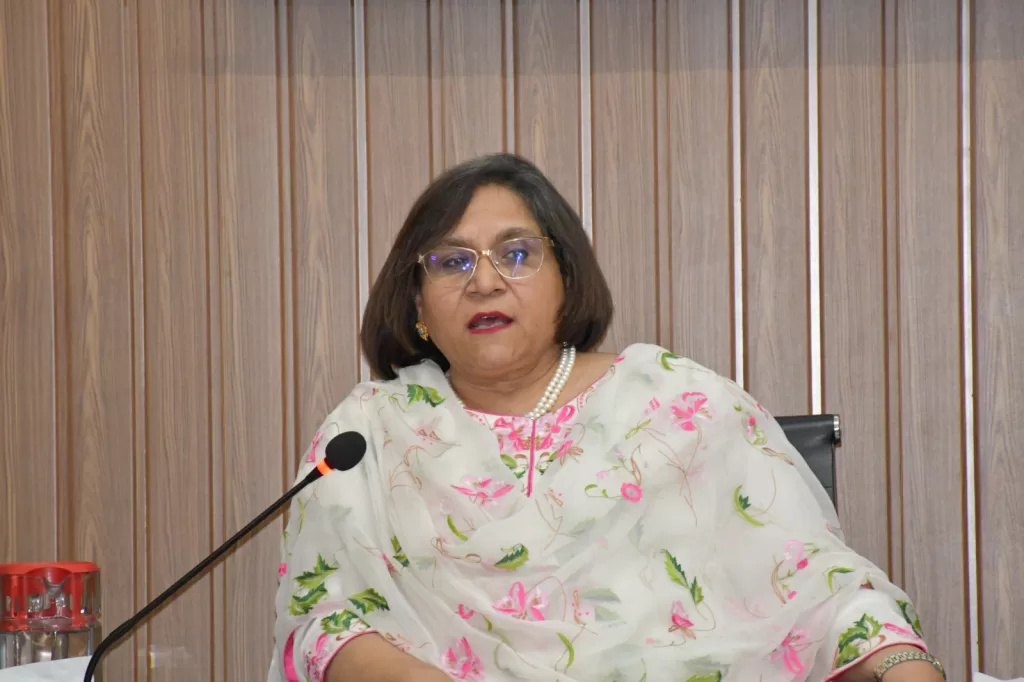
Ambassador Naghmana Hashmi: in her comments, extended her congratulations to Dr Huma Baqai for her book and described it as an outstanding publication. She said: the book would serve as an informative resource for intellectuals, Foreign Office professionals, and students interested in gaining insights into global affairs. It is an excellent book – a compilation of the author’s columns and articles and she backed her opinions logically and precisely – defending her unique perspective.
I appreciate her work as she meticulously selected 46 articles out of the hundreds she had written, arranging them in chronological order to form the content of the book.
Huma Baqai has brilliantly covered global facts, and how they affect Pakistan geopolitically and strategically as a multipolar world is emerging. She has explained nicely the US-China conflict and its impact on Pak-China relations, the rise & development of China, and Pakistan’s need to orient its strategic compass towards China.
I congratulate Dr Baqai for providing a comprehensive perspective on the global changes that have occurred from 2019 to the present. Furthermore, she acknowledged the author’s coverage of the ongoing transformation in Pakistan, spanning various aspects of politics, society, and more.
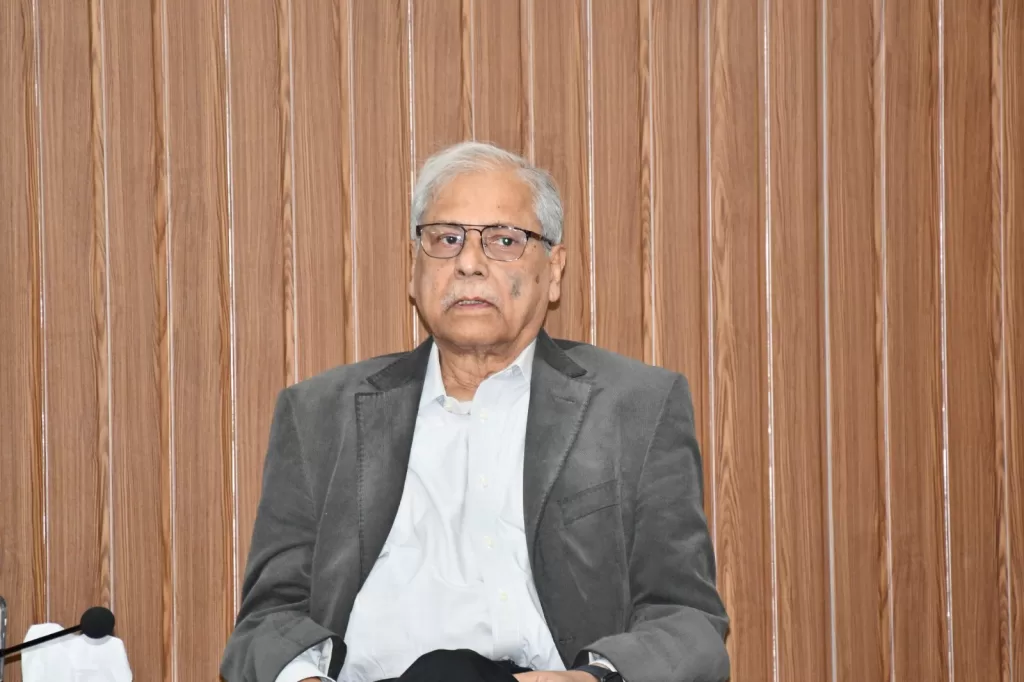
Zahid Hussain: I praise Prof Dr Huma Baqai’s book as a groundbreaking work that encapsulates the most significant international developments of the past six years. I admire the timeliness of the book, especially in the current global context, as it provides insights into the return of the Taliban to power in Afghanistan and the shifting dynamics of US-Pakistan relations.
With the US withdrawal from Afghanistan, Pakistan is now confronting a severe security challenge posed by Tehrik-i-Taliban Pakistan (TTP). Pakistan cannot avoid the repercussions of a hardline Islamist regime’s resurgence in its neighbouring country. Furthermore, unresolved regional dynamics and border issues with Afghanistan have compounded challenges for both Pakistan and Afghanistan.
US-Pakistan relations are reverting to a chilly phase similar to the situation before 9/11. The post-9/11 era was warming as Pakistan was designated a non-NATO ally. Now, the trajectory of the relationship needs to be redefined, as Washington has primarily viewed Pakistan through the lens of Afghanistan. Following the US withdrawal, both Islamabad and Washington must establish a broader connection beyond counter-terrorism and Afghanistan.
This relationship is very well explained by Huma and more importantly her simple and understandable style of opinions makes it attractive to the common man. Moreover, he noted that the book’s author, Dr Baqai, provides valuable insights into how Pakistan can navigate the current challenging environment. Thank you.
Prof Doc Huma Baqai currently holds the position of Rector at the Millennium Institute of Technology and Entrepreneurship in Karachi. Her previous roles encompass being an Associate Professor in the field of Social Sciences & Liberal Arts, and she has also served as the former Associate Dean of the Faculty of Business Administration at IBA in Karachi. For more than two decades, starting from 1999, she has actively engaged with both national and international media as an expert in international relations and a keen political analyst.
Her academic pursuits are noteworthy, including her role as a scholar, reviewer, author, and co-editor of two notable publications: “Pakistan-Afghanistan Relations: Pitfalls and Way Forward” in 2021 and “Making Sense of Post COVID-19 Politics” in 2020. Furthermore, she has authored 29 research articles that have been published in reputable national and international journals. Her skills extend beyond academia as she is a certified Corporate Trainer and a content developer.
Prof. Huma Baqai’s extensive involvement in electronic media spans over two decades, during which she has contributed to more than a thousand programs covering a wide spectrum of domestic, global, and social issues.
Additionally, she has actively participated in over two hundred national and international webinars and conferences. Her influence in the print media is evident through her contributions as a columnist, with over a hundred articles published in renowned magazines and newspapers. Presently, Huma Baqai holds the esteemed position of Vice Chair at the Karachi Council for Foreign Relations (KCFR), and she also serves on various advisory and governance boards.
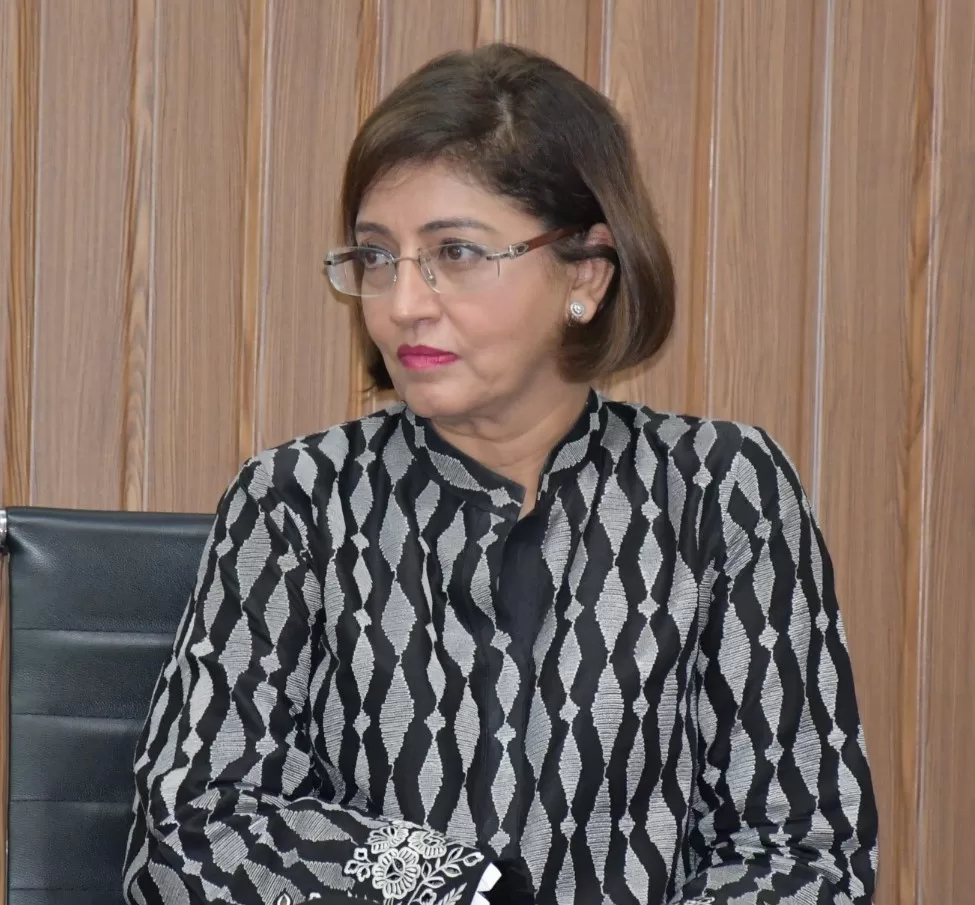
Professor Dr Huma Baqai: I extend my heartfelt appreciation to the IRS, with a special acknowledgement for Ms Reema Shaukat, for their excellent organization of the Book Launch event. Throughout the book’s creation, I traversed various phases of data collection.
I have been interacting with youth for the last 25 years in the classroom, and I feel that the youth’s lack of direction is due to the absence of a culture of book reading and writing in society. There is a pressing need to give direction to the intellectually starved youth in Pakistan.
There are 23 million children out of school, which is disturbing, but what worries me more is the quality of students in college. Their understanding and education are not up to the mark. We have to reinvent classrooms so that we can provide quality education. She didn’t blame students alone for being directionless and regarded the youth as the nation’s best hope for driving substantial change.
It is my third publication, conceived with the vision that a book should be composed in a lucid and reader-friendly style. The articles were thoughtfully selected, taking into account their pertinence in the continually evolving realm of contemporary issues. Out of my collection of 100 articles, a significant portion delved into subjects with a finite shelf life. The articles were chosen based on a criterion of enduring relevance.
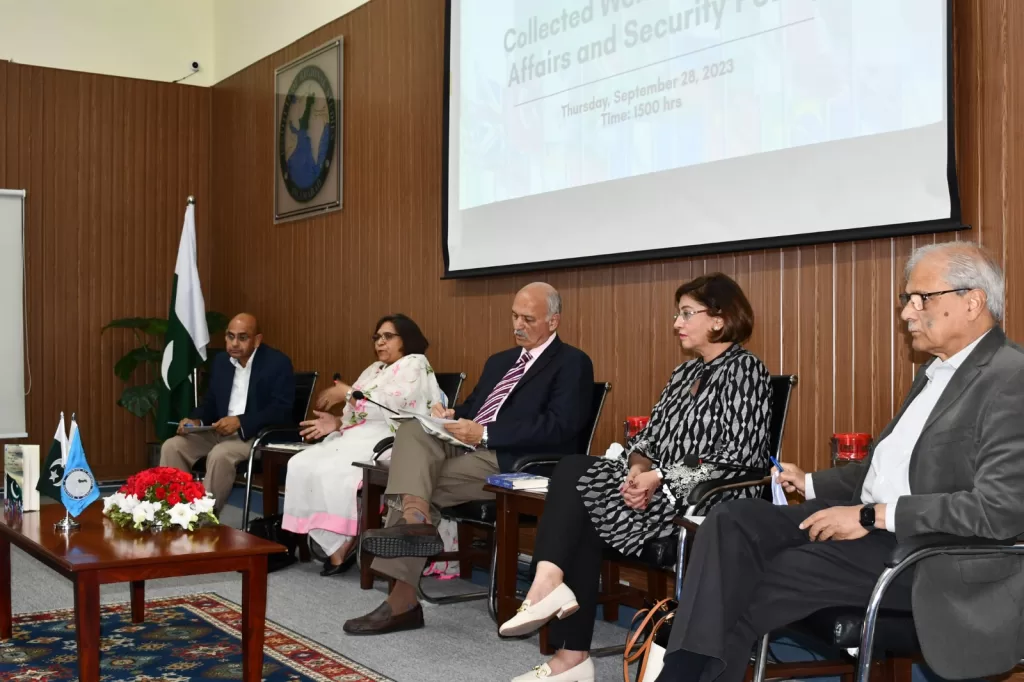
Discussants on the Stage
Additionally, my book could serve as a representation of Pakistan, promoting a more Pakistani perspective in its portrayal. I want to convey that intellectual hygiene is important and I think the book would also be a valuable resource for the journalism community in understanding the intricate concepts of geopolitics and international relations.
Dr Baqai responded to a question about policy failure in Pakistan, “I think the problem is that we have no continuity and sustainability in policies. I was a part of the team devising the National Security Policy (NSP) and everyone was focusing on a shift from geopolitics to geoeconomics, but it must be clear that geostrategy still dominates.”
Overall, I think a fundamental factor behind economic challenges and non-conventional security risks is the population growth rate of 3.2%. This issue is adverse and requires immediate attention.
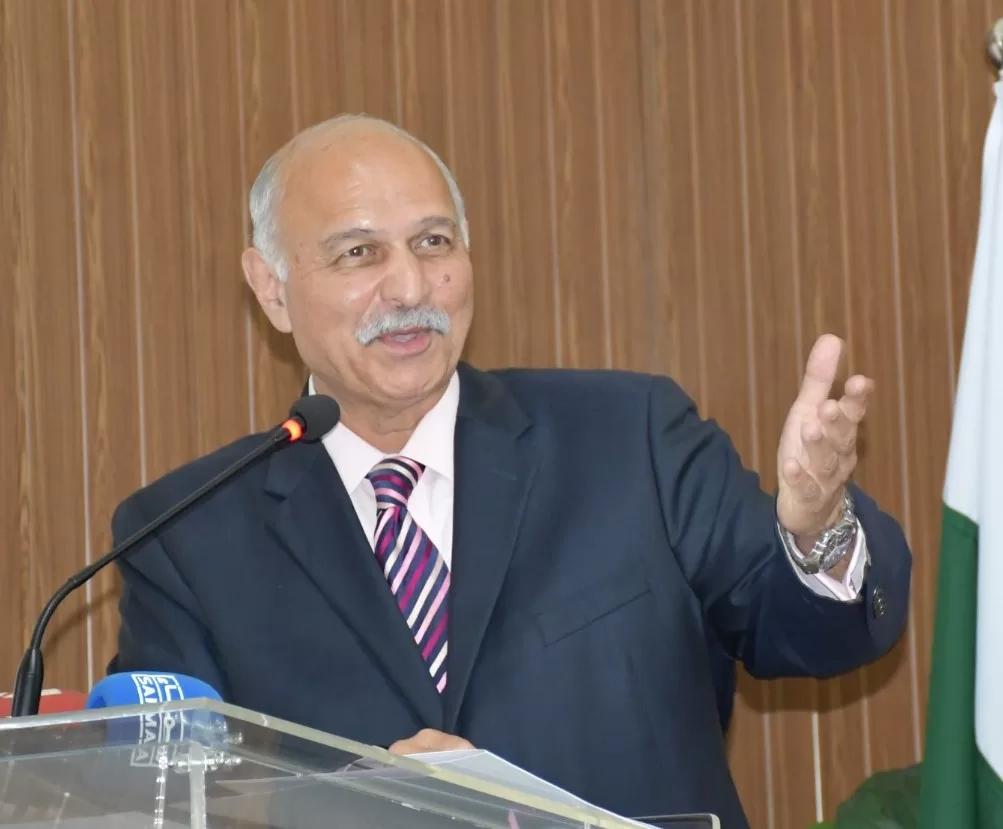
Senator Mushahid Hussain Sayed, the chief guest, while giving the keynote address, emphasized the necessity for Pakistan to have a clear and strategic direction to prevent becoming a pawn in the new Cold War era. He highlighted: the evolving global landscape, which is shifting towards a multilateral community of nations, rejecting the old unipolar world order. I commend the book as a valuable document that would guide both professionals and the general public. Dr Baqai has written articles without an ideological agenda and it makes her work remarkable.
I think foreign policy as a subject that receives daily commentary and the essence of the book is akin to “seek truth from facts,” an approach reminiscent of ancient Chinese scholars who emphasized the importance of acquiring solid facts for a correct understanding.
I want to put forward criticism first that the book seemed to overly use the term “Indo-Pacific,” whereas the original term was “Asia Pacific.” The shift to “Indo-Pacific” was driven by the European Union (EU), the United States, and others, primarily to include India, which had its motivations for self-projection.
I want to mention that Pakistan has undertaken several peace initiatives with India, notably the Kartarpur Corridor. This initiative put India on the defensive, and it was acknowledged by the international community. However, Dr Baqai’s book covers the Pulwama attack but does not include the Kartarpur Corridor, which was a significant step toward reconciliation during a crisis period.
The book’s significance in highlighting the Cold War aspect and also acknowledging the importance of the reconciliation between Saudi Arabia and Iran, considering it one of the region’s major achievements, is highlighted with facts.
I also noted the need to focus on how the world was evolving, given the absence of an institutionalized decision-making forum on both the civilian and military fronts in the country.
The world is experiencing a shift in global center of gravity from West to East and the time of 300 years of Western hegemony is approaching. This, I believe, left Pakistan with only reactive approaches that should be transformed into more prudent strategies.
I would tell you that Allama Iqbal’s poetry from nearly 90 years ago, predicting that this century belongs to Asia, is a reminder of Pakistan’s historical position. It is also notable that Pakistan’s strategic location and the importance of maintaining friendly relations with all nations is required while avoiding any involvement as a pawn in the new Cold War.
Pakistan must benefit from both China and the US with our geopolitical importance and must get geostrategic clarity in foreign policy.
The book launch event witnessed a diverse gathering, comprising scholars, current and former Pakistani diplomats, government officials, experts from research organizations, students, and members of the diplomatic community in Islamabad.
Dr Huma Baqai’s book has resonated with audiences from various walks of life due to its profound relevance in the realm of contemporary global politics and Pakistan’s pivotal role therein. It serves as a unifying resource, fostering informed discussions and critical insights into the ever-evolving dynamics of international affairs and the challenges faced by Pakistan.





